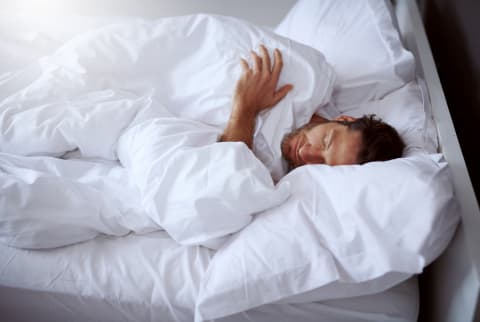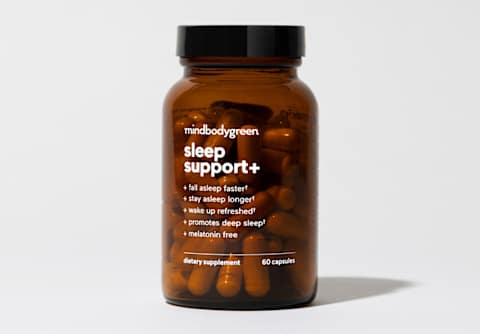Advertisement
I'm A Neuroscience Expert: This Is How I Prep My Body & Brain For Bed


I work with some of the highest-performing people on this planet. But collectively, they share a single behavioral flaw that cripples their mental creativity, emotional intelligence, and social adaptability. However, they're not alone. In fact, nearly 40% of us have this same flaw. We all seem to know about it, yet we struggle to correct the root cause.
If you haven't guessed what it is up to this point (drumroll, please...), it's sleep.
Solid sleep is essential to brain health and cognition. We use our brains constantly throughout the day, and as we do, the exchange of signals creates a buildup of metabolites between neurons (in the same way that our muscles get fatigued and eventually reach exhaustion). When we sleep, the brain turns on our glymphatic system, which acts as a cleaning agent and takes out the garbage for excretion.
When we don't get enough high-quality sleep, the waste starts to pile up—and we experience the symptoms of this neurological trash fire.
I believe that our sleep crisis breaks down into three main causes
Cultural norms
For better or worse (mostly worse), we are a hustle-and-grind culture. Nearly all of us have heard or used the saying "I'll sleep when I'm dead." However, a study from the journal Sleep has stated that "too little sleep and too much sleep are associated with adverse health outcomes." In reality, sleep is the best productivity tool we have at our disposal.
Technology and overstimulation
We don't know how to turn off anymore. Thanks to social media, technology, and infinite novelty, some say our average attention span is now lower than that of a goldfish. Technology can be our greatest tool or a weapon used against our well-being. If you don't intentionally use it, it will use you.
Weak work-life boundaries
Wait, aren't we supposed to have work-life balance? Yes, but balance is achieved through boundaries. If you're plugged into emails 24/7/365 without boundaries, it only fuels the "one more email" culture—and makes sleep that much harder to come by. In my role as a change management consultant, one of the first things I do with my employees is ensure that they work a 9-5 job.
What can we do about this?
Let's get down to solutions to these problems. My goal here is not to give you an influencer's checklist that includes three hours of pre-bed meditation, a two-hour yoga flow, and a 23-page journal session to really brain-dump the day.
I'm going to give you what I do as a single parent running a few companies whose main priority is waking up refreshed enough to make unicorn yogurt bowls for my daughter before school as we dance to the Frozen 2 soundtrack (because don't deny that it's way better than the first):
Cool things down
A large part of sleep is controlled by your RAS (reticular activating system), which supports biological signaling so the body and brain know what time it is and can coordinate hormones and neurotransmitters accordingly.
There are two big biological levers we can pull to naturally support these systems. Temperature comes first: As we begin to fall asleep, most large muscles settle down, and our body temperature drops.
To support this drop in body temperature, we can turn our bedroom thermostat down or take a shower before sleep. My system is even lazier than that: I have a facial roller that I keep in my freezer and use to roll my face before bed. The face is covered in temperature-sensitive neurons that are strongly connected to circadian biology. Based on my own biofeedback trends, this temperature hack has measurably changed my quality of sleep.
Use light to your advantage
The next lever we can pull is light: Because the brain is caged inside the ivory tower of our skull, no light penetrates it. It relies strongly on the eyes to tell us what time of day it is. This is why as the sun begins to set at nighttime, my house lights will also dim.
I don't use fancy high-tech lights that cost thousands of dollars. Instead, I just have some well-placed lamps with amber-colored light bulbs in them that emit an orangish glow at lower watts.
To further use light (or lack of light) to your advantage, you can make your technology screens as dim as functionally possible in the evening. Some also find benefits from blue-light-blocking glasses. However, I personally never do anything productive on technology at nighttime anyway, so I try not to use it very often.
Consider supplementation
There is no such thing as a silver bullet that can magically fix your sleep. However, starting to take sleep supplements is one change I've implemented that has had a noticeable impact on my quality of sleep.
A quick Google search for "sleep supplements" gives you 1,490,000,000 results. That's a lot. Luckily for us, mindbodygreen has our backs (and brains). They did the hard work for us by leveraging an extraordinary science team to produce a sleep supplement that I've been using for the last 10 months. sleep support+ has become a foundation of my nighttime routine.*
The nonhormonal sleep supplement features a combination of the right forms of magnesium, jujube extract (which the WHO also researched and found supportive for sleep1), and PharmaGABA®. GABA is a neurotransmitter that has an inhibitory function that helps settle the brain and calm us down.*
As always with supplementation, consult with your primary care doctor to see if they believe it can be supportive in your health journey.
The takeaway
When we don't get enough sleep, we do our brains a disservice. Implementing these three simple sleep strategies in my own life has allowed me to be a more creative writer and a more present and patient father. I hope they help you, too.
